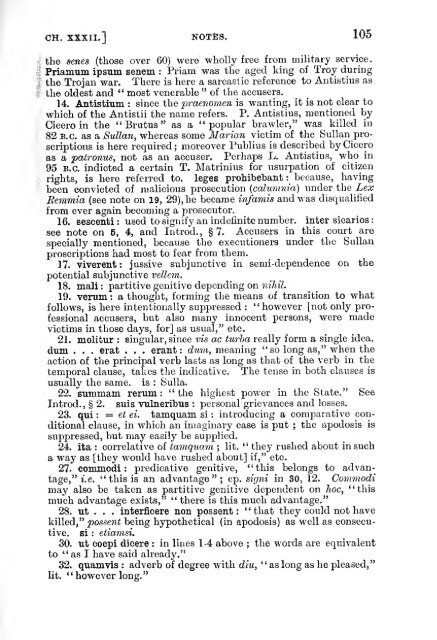Pro S. Roscio Amerino
Pro S. Roscio Amerino
Pro S. Roscio Amerino
You also want an ePaper? Increase the reach of your titles
YUMPU automatically turns print PDFs into web optimized ePapers that Google loves.
Ctt. XXXIl.] NOTfiS. 105<br />
i the senes (those over 60) were wholly free from military service.<br />
.? Priamum ipsum senem : Priam was the aged kiiig of Troy during<br />
the Trojan war. There is here a sarcastic reference to Antistius as<br />
I<br />
I the oldest and " most venerable" of the accusers.<br />
14. Antistium : since the praenomen is wanting, it is not clear to<br />
which of the Antistii the name refers. P. Antistius, mentioned by<br />
Cicero in tlie "Brutus" as a " popular brawler," was killed in<br />
82 B.c. as a Sullan, whereas some Marian victim of the Sullan proscriptions<br />
is here required ; moreover Publius is described by Cicero<br />
as a patronus, not as an accuser. Perhaps L. Antistius, who in<br />
95 B.C. indicted a certain T. Matrinius for usurpation of citizen<br />
,, rights, is here referred to. leges prohibebant : because, having<br />
' been convieted of malicious prosecution (calumnia) under the Lex<br />
Jiemmia (see note on 19, 29), he became infamis andwas disqualified<br />
from ever again becoming a prosecutor.<br />
16. sescenti: used tosignifyanindefinitenumber. inter sicarios<br />
see note on 6, 4, and Introd., §7. Accusers in this court are<br />
specially mentioned, because the executioners under the Sullan<br />
proseriptions had most to fear from them.<br />
17. viverent : jussive subjunctive in semi-dependence on the<br />
potential subjunctive vellem,<br />
18. mali : partitive genitive depending on nihil.<br />
19. verum : a thought, forming the means of transition to what<br />
foUows, is liere intentionally suppressed : "however [not only professional<br />
accusers, but also many innocent persons, were made<br />
victims in tliose days, for] as usual," etc.<br />
21. molitur : singular, since vis ac turha really form a single idea.<br />
dum . . . erat . . . erant : dmn, meaning "so long as," when the<br />
action of the principal verb lasts as long as that of the verb in the<br />
temporal clause, takes the indicative. The tense in both clauses is<br />
usually the same. is : Sulla.<br />
22. summam rerum " : the highest power in the State." See<br />
Introd., § 2. suis vulneribus : personal grievances and losses.<br />
23. qui : = et ei. tamquam si : introducing a comparative conditional<br />
clause, in which an imaginary case is put ; the apodosis is<br />
suppressed, but may easily be supplied.<br />
24. ita : correlative of tamquavfi ; lit. " they rushed about insuch<br />
a way as [they would have rushed about] if," etc.<br />
'<br />
27. commodi : piedicative genitive, ' this belongs to advantage,"<br />
i.e. " this is an advantage"; cp. signi in 30, 12. Commodi<br />
may also be taken as partitive genitive dependent on lioc, " this<br />
much advantage exists," " there is tliis much advantage."<br />
28. ut . . . interficere non possent : "that they could not have<br />
killed," posaent being hypothetical (in apodosis) as well as consecutive.<br />
si : etiamsi.<br />
30. ut coepi dicere : in lines 1-4 above ; the words are equivalent<br />
to " as I have said already."<br />
32. quamvis : adverb of degree with diu, " as long as he pleased,"<br />
lit. "however long."<br />
:

















